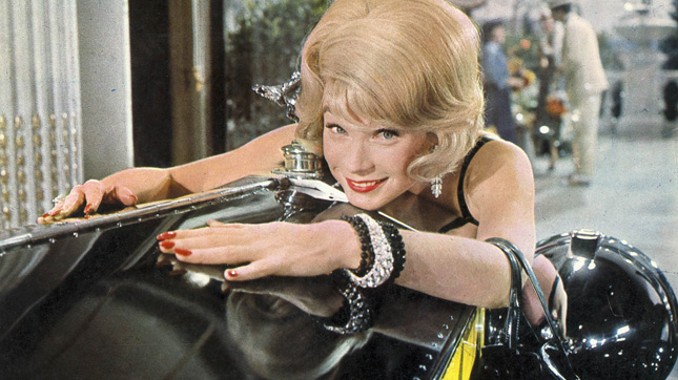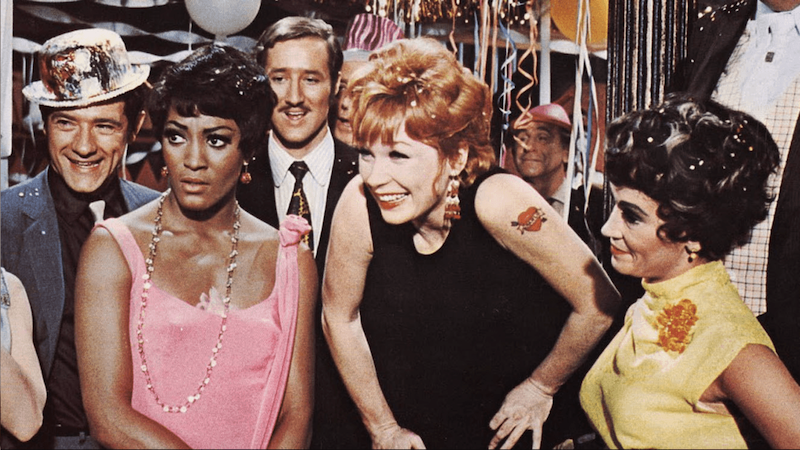
From 1964: A somewhat strange concoction, The Yellow Rolls Royce is a star-studded anthology, a look at the life of, well, a yellow Rolls Royce Phantom during the 1930s and 40s.
The synopsis:
“One Rolls-Royce belongs to three vastly different owners, starting with Lord Charles, who buys the car for his wife as an anniversary present. Another owner is Paolo Maltese, a mafioso who purchases the car during a trip to Italy and leaves it with his girlfriend while he returns to Chicago. Later, the car is owned by American widow Gerda, who joins the Yugoslavian resistance against the invading Nazis.”
TMDb
The New York Times reviewer A.H. Weiler wasn’t terribly kind to this “assembly line job.” He wrote on 14-May-65:
“… ‘The Yellow Rolls-Royce,’ which arrived yesterday at the Music Hall fresh from Metro-Goldwyn-Mayer’s European works, performs, despite its color, opulence and surface polish, largely like an assembly-line job. It is, it should be stressed, a pretty slick vehicle, that is pleasing to the eye and occasionally amusing, but it hardly seems worthy of all the effort and the noted personalities involved in the three glossy but superficial stories that make up this shiny package. One is reminded of the now classic Rolls-Royce advertising slogan, “The loudest noise comes from the clock.”
…
“‘The Yellow Rolls Royce’ may be a rich, handsome, colorful vehicle. But, aside from its varied passengers, it simply indicates that the Rolls can be pretty rough on romance.”
The New York Times
The most enjoyable part of this vehicle (see what I did there?) is probably the Shirley MacLaine/Alain Delon/George C. Scott/Art Carney story. Scott is a Capone-style 20s gangster, MacLaine is his gun moll, and Delon is her seducer, while Carney gets to drive his boss and the moll around and keep tabs on what Delon is up to while sightseeing in the Rolls. I said enjoyable, but probably meant amused.
TCM accompanied this showing with a short shown in theaters at the time extolling the virtues of the Rolls Royce and its appearance in the forthcoming film. This makes it seem that Rolls Royce had paid millions for a movie-length advertisement, and that’s not far off the mark. There is an attempt to focus on the stories in the anthology, but that yellow car is always in at least the background, ubiquitous.
In other words, this is probably the granddaddy of all product placement movies, far more egregious than even Joan Crawford’s conspicuous scattering of Pepsi bottles in Strait Jacket (see below). The Yellow Rolls Royce is worth watching for the performances of the greats of the Golden Age’s transition into … whatever we call what came once the Golden Age was dead … but the value probably ends there. I gave it four stars simply for those performances by those greats; there’s not much more to it than those, sadly.


Best quotes:
Mae Jenkins: [Looking indifferently at the leaning tower of Pisa] “So it leans. So a lot of things lean.”
The Yellow Rolls Royce
Paolo Maltese: [Turning to Mae] “You ever heard of Galileo, maybe?”
Mae Jenkins: “Sure I have heard of Galileo.”
Paolo Maltese: [Turning to Joey] “She ever heard of Galileo?”
Joey Friedlander: “Nah …”
Paolo Maltese: “Five-six hundred years ago, this Galileo dropped two stones off that tower, one big one, and one little one.”
Mae Jenkins: “So?”
Paolo Maltese: “So he proved the law of gravity or somethin’. I don’t know.”
Mae Jenkins: “And brained a couple of citizens, maybe. Big deal.”
Paolo Maltese: “And this is the girl, my fidanzata, that I am bringing home to meet my folks. Of all the women in the whole world that I can choose from to be my wife, who do I choose? An ignorant slob of a hatcheck girl who thinks Pisa – Piazza del Duomo in Pisa, Joey – is a stopping-off place between hamburger joints.”
Ibid

The Yellow Rolls Royce. 1964. TCM. English. Anthony Asquith (d). Terence Rattigan (w). Ingrid Bergman, Rex Harrison, Shirley MacLaine, Jeanne Moreau, George C. Scott, Omar Sharif, Alain Delon, Art Carney, Joyce Grenfell, Edmund Purdom, Wally Cox. (p). Riz Ortolani (m). Jack Hildyard (c).





